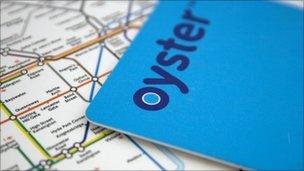Touchless payment coming to mobile phones
- Published
Much of the discussion at Mobile World Congress has been about turning the mobile phone into a payment device.
Handset manufacturers, network operators and even the boss of Google have been talking-up Near Field Communication (NFC).
The technology allows nearby devices to exchange data - for example a sales transaction - and is seen as a way for mobiles to replace the plastic in people's wallets.
At MWC, Orange announced it would be partnering with Samsung to roll out NFC-based contactless systems across Europe.
Smart shopping
Meanwhile Google chief executive Eric Schmidt looked forward to a time when NFC would help him buy trousers.
In his keynote address, Mr Schmidt said NFC "should revolutionise payments when tied to advertising and location".
He offered a scenario.
"I'm walking down the street and I need pants [trousers]. My phone has an NFC chip. It knows where I am.
"It tells me about two stores, one to the left with a 20% discount and one to the right with a 30% [discount].
"It is programmed to know I am a cheapskate so points me to the right and the store knows what pants I want," he said.
Later this year, Orange will launch the NFC-enabled Samsung Wave 578 in Spain, Poland and France.
It is the first in a series of NFC-enabled handsets the firm plans to sell, along with others from LG and Nokia.
The phones feature an NFC antenna connected directly to a special SIM card that allows the owner's identity to be authenticated.
Such security is seen as crucial to the success of NFC payment systems.
Pay as you go
Anne Bouverot, executive vice president of mobile services at Orange described NFC as the third wave of the mobile revoultion, after voice services and mobile data.
"Mobile contactless services will change people's daily lives," she said.
NFC could also offer new-found revenue for cash-strapped mobile operators, thinks Philippe Vallee of NFC-chip firm Gemalto.
"They could rent part of the SIM or charge an activation fee to the bank," he said.
While much of the current NFC technology, especially in Asia where it is most advanced, focuses on using the mobile as a replacement for cash or travel cards, there are wider possibilities.
"It could be used to tap in loyalty points," said Mr Vallee, "or for employees to gain access to a building."

One of the early uses of NFC payment technology was for travel cards.
In the UK, where Orange is launching NFC with Barclays this summer, only a handful of retailers - including Pret a Manger, Little Chef and the National Trust - are signed up.
One of the biggest issues with the technology has been persuading retailers to buy NFC-enabled machines.
In the developing world, where the huge growth of mobile banking means new hardware is constantly being introduced, this is less of an issue.
"We need to roll out the hardware so we may as well roll it out NFC-ready," said Hannes van Rensburg, the chief executive of mobile money firm Fundamo.
NFC advocates claim that swiping a mobile phone to make payments or receive money is more secure than using manual transactions and will help eliminate fraud.
"People will be able to make payments more quickly, more accurately and more securely," said Mr van Rensburg.
He added that the current lack of NFC-enabled handsets should not prove a barrier to its uptake, thanks to temporary solutions that add limited features.
"We will use RFID stickers which can be put on phones," he said.